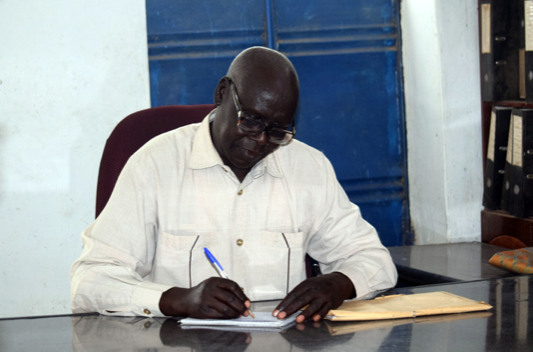Renk County in Upper Nile State practices mechanized farming and increasing fuel prices in the country have become a blow to agriculture in the region.
Farmers cannot cultivate this year since they can’t meet the high cost and millions of Feddans will go to waste, according to Simon Kiir Adiang, the chairperson of the farmers Union in Upper Nile state.
“We in Upper Nile just depend on farming, we have more than 3 million Feddans here in Renk but due to high prices of fuel we will not able to cultivate this unless we get support from the government and other well-wishers,” Adiang told journalists in Renk town.
While a drum of fuel currently sells at 200,000 SSP, Adiang has fears that it will still shoot up.
Renk is the biggest producer of Sorghum and the main supplier to the country.
Coupled with high prices, the economic situation eroded purchasing power and farmers can now only rely on World Food Program for the market.
“We have a lot of challenges that are facing us as farmers, one of them is the issue of the market but now WFP is buying a good quantity of sorghum from us,” Adiang said.
“Before we didn’t have a market because of roads, insecurity among others, and all our food used to get spoiled in the stores.” He said.
Adiang believes with the support of fuel subsidies, they can feed the whole country with the food they produce in Renk and other parts of Upper Nile state.
“Most farmers currently do not have the capital to start cultivation,” he said.
Kur Dau, the chairperson of the farmers union in Renk County said the failure to begin cultivation over the high price of fuel will be costly to the production of food.
“If a drum of fuel is now 200,000 to 250,000 SSP early like this before farming, what will be the prices later if we start farming?” Dau said.
“That price is too much for us as farmers to afford because if somebody is going to cultivate 1000 Feddans how many drums of fuel it’s going to use to cultivate those? It’s difficult for us,” he said.
Nyok Deng, the farmer is resigned to the fact that he won’t be cultivating this year.
“I don’t think I am going to cultivate this year due to the high prices of fuel,” Deng said.
“I wanted to cultivate 500 Feddans and one drum of fuel is 200,000 SSP. How many drums am I going to use to cultivate that big area? It will be difficult to cultivate because that will cost a lot and I also have workers that I am going to pay at the end of the day, it’s better not to cultivate,” he said.
And like Adiang, Deng is requesting assistance with fuel subsidies in order to rectify the situation.
“We have Ministry of Agriculture and Agriculture Bank of South Sudan, they are supposed to support us like to bring fuel and subsidize it for us but they are not doing that,” he said.
“We are buying from the black market and that one is very expensive for us who are going to buy a big quantity of fuel. Let the Ministry of Agriculture be the real ministry not only the names.”
Mary William, the Minister of Agriculture, Environment and Forestry in Upper Nile State said her government is working towards helping the farmers so that they can produce enough food for the country.
“Renk can feed the whole country, agriculture in Renk is very important,” William said.
“We want to cultivate 5 million feddans in Upper Nile state this year but if there is no support to the farmers it will be impossible for them to cultivate this year,” she said.
“We are going to try our best as government to support the farmers and also we are urging those with good hearts to support our farmers so they will be in a position to go to their farms.”
Renk was part of the Rabak Agricultural Scheme established in the 1970s. The Sudan Government by then demarcated and allocated 2.5 million feddans for farmlands, introduced irrigation schemes on a 200-km stretch along the Nile between Jalhak and Rabak and constructed food storage facilities.
After independence, South Sudan (Renk community) adopted the scheme with approximately 1,000,000 fedans of farmland and storage facilities with about 20,000 metric tonnes’ capacity.
However, the South Sudan Ministry of Agriculture (and the Agricultural Bank of South Sudan) could not sustain the provision of required inputs to support agriculture.
Consequently, only about 30 per cent of the farmland in Renk is being utilized. The agro-business is dominated by individual farmers (initially funded by Sudanese farmers from Kosti and Khartoum). They produce between 15,000 and 50,000 mts of sorghum and 5,000 mts of simsim annually; and around 4,000 mts of other crops (which includes harvesting of gum arabic)















